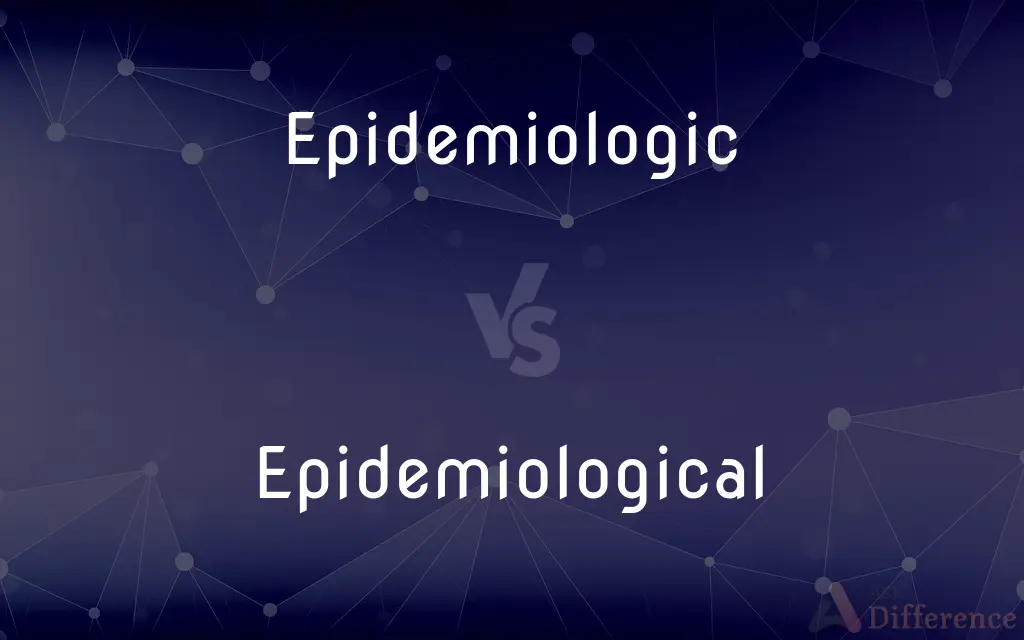Epidemiologic vs. Epidemiological — What's the Difference?
Edited by Tayyaba Rehman — By Urooj Arif — Updated on April 1, 2024
"Epidemiologic" and "epidemiological" both pertain to epidemiology, the study of disease distribution and determinants in populations. The difference lies primarily in usage preference, with "epidemiological" being more commonly used.

Difference Between Epidemiologic and Epidemiological
Table of Contents
ADVERTISEMENT
Key Differences
The terms "epidemiologic" and "epidemiological" are adjectives derived from the noun "epidemiology," which is the medical science that deals with the incidence, distribution, and control of diseases in a population. Both adjectives describe anything related to this field, such as studies, data, or methods. While "epidemiological" might be preferred in many contexts for its phonetic flow, "epidemiologic" is equally correct and may be used interchangeably in most scientific and academic writings.
In literature and professional discourse, "epidemiological" is more frequently encountered. This prevalence could be attributed to its ease of pronunciation or the tendency in English to favor longer, more rhythmically flowing adjectives for technical terms. However, "epidemiologic" serves the same function and is sometimes chosen for brevity, especially in compound terms or where space is a consideration, such as in journal articles, headlines, or databases.
The choice between "epidemiologic" and "epidemiological" can also reflect regional preferences, with some English-speaking regions or academic journals showing a predilection for one over the other. Despite these variations, there is no difference in meaning between the two, and both are accepted in academic and professional settings.
The usage of "epidemiologic" versus "epidemiological" does not indicate a difference in the aspect of epidemiology being discussed. Whether one is referring to the statistical analysis of a disease outbreak, the patterns of health and disease conditions in specific populations, or the factors influencing the prevalence of diseases, either adjective can be appropriately applied.
The decision to use "epidemiologic" or "epidemiological" is largely a matter of stylistic preference and does not reflect a substantive difference in meaning. Scholars and professionals in the field of epidemiology may choose one term over the other based on considerations such as readability, tradition, or editorial standards, but their choice does not alter the underlying significance of the reference.
ADVERTISEMENT
Comparison Chart
Definition
Relating to the study of how diseases spread and can be controlled in populations.
Relating to the study of how diseases spread and can be controlled in populations.
Usage Frequency
Less commonly used
More commonly used
Phonetics
Shorter and possibly perceived as more formal or technical.
Longer, potentially offering a smoother phonetic flow.
Preference in Text
May be preferred for brevity in certain contexts, such as titles or compact text.
Often preferred in extended discourse for its rhythmic quality.
Regional Variations
Usage may vary by region or publication.
Usage may vary by region or publication, with some showing a strong preference for this form.
Compare with Definitions
Epidemiologic
Reflecting the statistical study of populations.
Epidemiologic findings can lead to better disease prevention strategies.
Epidemiological
Concerned with how diseases affect populations.
Epidemiological insights are vital for effective public health interventions.
Epidemiologic
Related to the study of disease patterns.
Epidemiologic methods help track the spread of diseases.
Epidemiological
Pertaining to the analysis of health data across populations.
Epidemiological data is crucial for developing health policies.
Epidemiologic
Concerned with the determinants of health issues.
Epidemiologic studies examine factors affecting disease outbreaks.
Epidemiological
Involving the examination of disease determinants.
Epidemiological research identifies risk factors for diseases.
Epidemiologic
Pertaining to the science of epidemiology.
Epidemiologic research is crucial for public health.
Epidemiological
Relating to the study of disease distribution and control.
Epidemiological studies have advanced our understanding of infectious diseases.
Epidemiologic
Involving the analysis of health and disease conditions.
Epidemiologic data informs health policy decisions.
Epidemiological
Focused on the statistical patterns of health issues.
Epidemiological methods are essential for disease surveillance.
Epidemiologic
The branch of medicine that deals with the study of the causes, distribution, and control of disease in populations.
Epidemiological
The branch of medicine that deals with the study of the causes, distribution, and control of disease in populations.
Epidemiologic
Of or pertaining to epidemiology.
Epidemiological
Of or pertaining to epidemiology.
Epidemiologic
Connected with, or pertaining to, epidemiology; as, epidemiological studies.
Epidemiological
Of or relating to epidemiology;
Epidemiological studies
Epidemiologic
Of or relating to epidemiology;
Epidemiological studies
Common Curiosities
What does "epidemiological" mean?
"Epidemiological" pertains to the study, analysis, and control of disease patterns, as well as the health conditions affecting groups of people.
Is there a difference in meaning between "epidemiologic" and "epidemiological"?
No, there is no difference in meaning. The choice between them is a matter of stylistic preference or editorial standards.
What does "epidemiologic" mean?
"Epidemiologic" refers to anything related to the study of how diseases spread, their control, and their effects on populations.
Are there any regional preferences for using "epidemiologic" or "epidemiological"?
Yes, there can be regional or publication-specific preferences, but these do not affect the terms' interchangeability or meaning.
Can "epidemiologic" and "epidemiological" be used interchangeably?
Yes, they can be used interchangeably in academic and professional contexts without changing the meaning of the text.
Why might someone choose "epidemiologic" over "epidemiological"?
Someone might choose "epidemiologic" for brevity, especially in contexts where space is limited, such as in titles or database entries.
Which term is more commonly used, "epidemiologic" or "epidemiological"?
"Epidemiological" is more commonly used in literature and academic writing.
How important is the choice between "epidemiologic" and "epidemiological" in scientific writing?
While both terms are correct and interchangeable, the choice may depend on journal guidelines, regional preferences, or the flow of the text.
Can the use of "epidemiologic" or "epidemiological" influence the perception of a text?
The choice might slightly influence the text's perceived formality or readability, but it does not affect the scientific accuracy or integrity.
Is one term preferred in certain types of epidemiological studies?
No, the preference does not depend on the type of study. Both terms are applicable across all epidemiological research areas.
Share Your Discovery

Previous Comparison
Netizen vs. Citizen
Next Comparison
Fund vs. GrantAuthor Spotlight
Written by
Urooj ArifUrooj is a skilled content writer at Ask Difference, known for her exceptional ability to simplify complex topics into engaging and informative content. With a passion for research and a flair for clear, concise writing, she consistently delivers articles that resonate with our diverse audience.
Edited by
Tayyaba RehmanTayyaba Rehman is a distinguished writer, currently serving as a primary contributor to askdifference.com. As a researcher in semantics and etymology, Tayyaba's passion for the complexity of languages and their distinctions has found a perfect home on the platform. Tayyaba delves into the intricacies of language, distinguishing between commonly confused words and phrases, thereby providing clarity for readers worldwide.














































